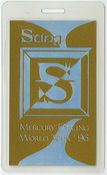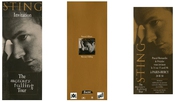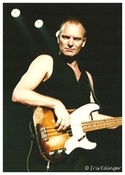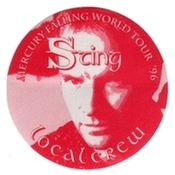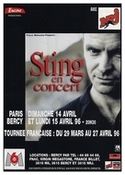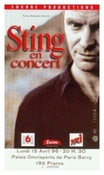
Sting warms up at Bercy before opening the Printemps de Bourges; The former frontman of the English band Police in mixed mood...
The Printemps de Bourges, which is celebrating its twentieth anniversary (Le Monde dates it from April 14-15), opens on Tuesday, April 16, with a concert by Sting. The former bassist and frontman of the Police, defender of the Amazon rainforest, and a media figure of the 1980s, was at the Palais Omnisport de Paris-Bercy on Sunday the 14th and Monday the 15th. His polished melodies didn't thrill a venue that was only two-thirds full.
As for the rest of Sting's French tour, Natalie Merchant played the American headline act at Bercy on Monday, April 15. The former singer of 10,000 Maniacs, the model folk-rock band from the East Coast of the United States, is a small woman, seemingly unremarkable at first glance. But when she lets down her hair, begins to twirl and sing with a voice that strangely combines austerity and sensual exuberance, her seduction is complete. The songs on Tigerlily, her first solo album, suffer from a certain monotony, but this song, which leads to the edge of the precipice, captivates and moves like few others today. Of course, we would like to enjoy it in a more intimate setting, but the Palais Omnisports is apparently the one that suits stars of Sting's rank.
Surprisingly, however, for this second Parisian concert (the first took place on Sunday the 14th), the POPB is only two-thirds full. The former Police frontman went solo ten years ago, dabbled in film with varying degrees of success (Dune, Quadrophenia, Radio On), and carved out an image as a militant rocker dedicated to good causes (Amnesty, Band Aid, ecology), eventually becoming one of the media figures of the 1980s.
The blond dandy from Newcastle has become more discreet today. He had the satisfaction of seeing his association, the Rainforest Foundation, save a piece of Amazon rainforest the size of Switzerland, but has decided against appealing to the public and the media. Perhaps a reminder of some recent and bitter experiences? In 1995, he filmed a commercial in Japan for a hotel complex whose construction had led to the felling of 100,000 pine trees. Accused of hypocrisy, he pleaded deception. A few weeks later, he took an explosive stance in favour of the legalization of ecstasy, in an effort to prevent the circulation of poor-quality products. Sting now prefers to express himself through music, focusing more on the melancholy of the mature man than on the humanitarian front. An album of pastel shades and minor modes, Mercury Falling, his latest opus, plays on gravitas by varying styles and refining melodies.
A slender, handsome man dressed all in black, holding his bass guitar in a chivalrous manner, Gordon Matthew Sumner, known as Sting, still has great allure. His voice, with a veiled and slightly nasal timbre like a Creole spoken in the north of England, embodies his undeniable charisma. Yet the pop star seemed static during this disappointing concert. Bathed in pale lights, surrounded by black cubes onto which insignificant drawings are projected, the band—a guitarist, a keyboardist, a drummer, two horn players, and Sting on bass—often contented itself with reproducing, in all their wisdom, the sounds of the last album.
Since leaving the Police, the singer has regularly criticized rock's conformism and its narrow style. Mercury Falling's songs range from soul, bossa nova, jazz, country, and Celtic folk. A skilled melodist, Sting knows how to take advantage of each musical style, even if it means sometimes preferring decorum to essence. An excellent performer, the tall, blond man sterilizes almost as much as he vampirizes. For example, a cover of "The Wind Cries Mary" transforms the carnal sweetness of this Jimi Hendrix song into a mellow song, despite or because of the contribution of John McLaughlin, a jazz-rock guitar virtuoso, invited for the occasion. By smoothing out the edges of his strong songs, Sting manages to categorize his mid-tempo hits into a category Americans like to call AOR, or adult-oriented, synonymous with maturity and, often, boredom.
While the bassist has undeniably released a few solo pop classics that still send shivers down our spines, like "Englishman In New York" and "Fragile," closing in front of a swarm of lighters, it's, ironically enough, the Police tracks that spark the most. "Every Little Thing She Does Is Magic," "Demolition Man," "Every Breath You Take," "Roxanne," and its eternal "yiho yihoho" sung by the crowd, have proven their longevity. Jazz and progressive rock musicians opportunistically playing the role of a new wave trio, the Police knew how to craft straightforward songs, and in concert, their alchemy radiated more than Sting's on that April evening.
(c) Le Monde by Davet Stephane




